ICSID仲裁规则.doc
了解国际仲裁规则国际仲裁机构的仲裁规则和程序
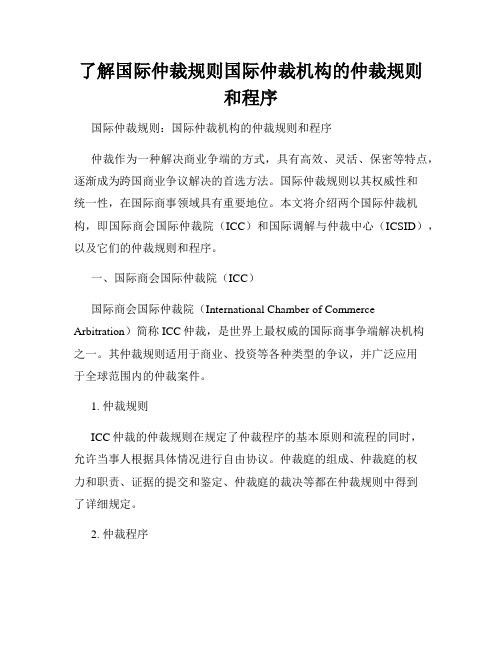
了解国际仲裁规则国际仲裁机构的仲裁规则和程序国际仲裁规则:国际仲裁机构的仲裁规则和程序仲裁作为一种解决商业争端的方式,具有高效、灵活、保密等特点,逐渐成为跨国商业争议解决的首选方法。
国际仲裁规则以其权威性和统一性,在国际商事领域具有重要地位。
本文将介绍两个国际仲裁机构,即国际商会国际仲裁院(ICC)和国际调解与仲裁中心(ICSID),以及它们的仲裁规则和程序。
一、国际商会国际仲裁院(ICC)国际商会国际仲裁院(International Chamber of Commerce Arbitration)简称ICC仲裁,是世界上最权威的国际商事争端解决机构之一。
其仲裁规则适用于商业、投资等各种类型的争议,并广泛应用于全球范围内的仲裁案件。
1. 仲裁规则ICC仲裁的仲裁规则在规定了仲裁程序的基本原则和流程的同时,允许当事人根据具体情况进行自由协议。
仲裁庭的组成、仲裁庭的权力和职责、证据的提交和鉴定、仲裁庭的裁决等都在仲裁规则中得到了详细规定。
2. 仲裁程序ICC仲裁程序包括起诉、答辩、庭审和裁决等环节。
起诉时,当事人需要提交仲裁请求;答辩时,被申请人需要提交答辩意见;庭审时,仲裁庭将听取双方的陈述和证据,并有权要求补充材料;最后,仲裁庭将以书面形式作出裁决。
二、国际调解与仲裁中心(ICSID)国际调解与仲裁中心(International Centre for Settlement of Investment Disputes)简称ICSID,是以解决国际投资争端为主要目标的仲裁机构。
其下属的仲裁规则在国际投资领域具有广泛的适用性。
1. 仲裁规则ICSID仲裁的仲裁规则主要适用于国家与外国投资人之间的投资争端。
仲裁规则规定了争端解决的程序,包括仲裁庭的组成、法官的任命、证据的提交和保密等。
2. 仲裁程序ICSID仲裁程序分为申请、答辩、听证和裁决等环节。
申请时,申请人需要向ICSID提交仲裁请求;答辩时,被申请人需要向ICSID提交答辩意见;听证时,仲裁庭将听取双方的陈述和证据,并进行调解;最后,仲裁庭将作出裁决并通知当事人。
ICSID机制下的国际商事仲裁透明度规则

ICSID机制下的国际商事仲裁透明度规则ICSID机制下的国际商事仲裁透明度规则本文关键词:商事,透明度,仲裁,机制,规则ICSID机制下的国际商事仲裁透明度规则本文简介:第二章国际投资仲裁机制中的透明度规则无论是区域投资协定还是双边投资协定,投资者与国家间的投资争端解解决大部分是在国际投资仲裁机制中解决的。
因此,对于国际投资仲裁机制中透明度规则的研究是必不可少,其中最具有代表性的是ICSID仲裁规则和UNCITRAL仲裁规则中关于透明度的规定。
文章第二部分主要对ICSID机制下的国际商事仲裁透明度规则本文内容:第二章国际投资仲裁机制中的透明度规则无论是区域投资协定还是双边投资协定,投资者与国家间的投资争端解解决大部分是在国际投资仲裁机制中解决的。
因此,对于国际投资仲裁机制中透明度规则的研究是必不可少,其中最具有代表性的是 ICSID 仲裁规则和UNCITRAL 仲裁规则中关于透明度的规定。
文章第二部分主要对两大典型的国际投资仲裁机制的透明度规则的具体规定及其在案件中的实际应用做系统的梳理和分析评价。
第一节 ICSID 机制下的国际投资仲裁透明度规则。
二十世纪五六十年代,广大发展中国家为了取得经济上的独立,纷纷对国内的外资进行国有化,因此就产生了南北国家间投资争端解决的问题。
为了解决该问题,创造良好的国际投资环境,在世界银行的主导下, 1965 年制定了《解决国家与他国国民间投资争端公约》(Convention on the Settlement ofDisputes Between States and Nationals of Other States),即《华盛顿公约》。
同时也创立了解决投资争端国际中心(International Center for Settlement ofInvestment Disputes, ICSID),该中心旨在解决一方为主权国家另一方为私人投资者的争端,且争端主权国家和投资者的国籍国均为《华盛顿公约》缔约国。
icsid管辖权条件
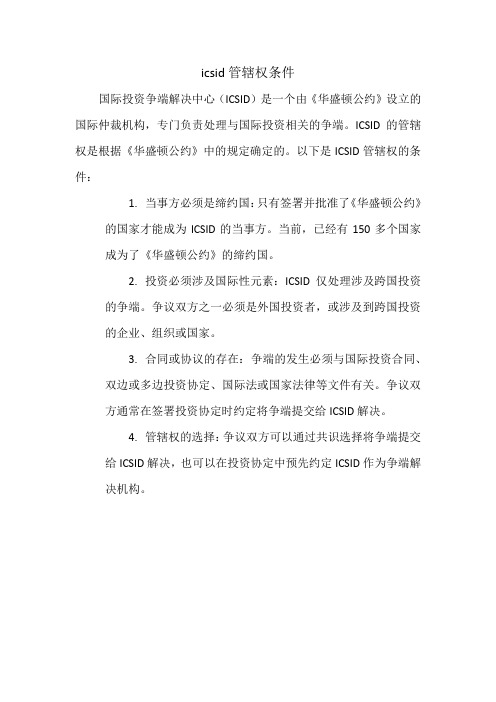
icsid管辖权条件
国际投资争端解决中心(ICSID)是一个由《华盛顿公约》设立的国际仲裁机构,专门负责处理与国际投资相关的争端。
ICSID的管辖权是根据《华盛顿公约》中的规定确定的。
以下是ICSID管辖权的条件:
1.当事方必须是缔约国:只有签署并批准了《华盛顿公约》
的国家才能成为ICSID的当事方。
当前,已经有150多个国家
成为了《华盛顿公约》的缔约国。
2.投资必须涉及国际性元素:ICSID仅处理涉及跨国投资
的争端。
争议双方之一必须是外国投资者,或涉及到跨国投资
的企业、组织或国家。
3.合同或协议的存在:争端的发生必须与国际投资合同、
双边或多边投资协定、国际法或国家法律等文件有关。
争议双
方通常在签署投资协定时约定将争端提交给ICSID解决。
4.管辖权的选择:争议双方可以通过共识选择将争端提交
给ICSID解决,也可以在投资协定中预先约定ICSID作为争端解
决机构。
ICSID的法律制度

华盛顿公约
发展中国家加强对外国资本进行监管,并实行国有化或征收,引发了西方 国家与发展中国家之间有关国际投资的矛盾。为了解决这些矛盾,在世界 银行倡导下,于1965年签署了《解决国家与他国国民间投资争端公约》, 于1966年10月14日生效,设立了“解决投资争端国际中心” (International Centre for Settlement of Investment Disputes ,简称ICSID 或“中心”)。该中心为广义上的世界银行集团成员,因此,成员国必须 为世界银行成员国。
中心受理案件后,组成仲裁庭进行审理。仲裁庭由双方同意的独任仲裁员 或3名仲裁员组成。仲裁程序应当按照公约规定进行,即除当事人另有约 定外,应当依照当事人同意提交仲裁之日有效的仲裁规则进行仲裁。仲裁 裁决应以全体成员多数票作出,并应采用书面形式,由赞成此裁决成员签 署。任何仲裁员都可以在裁决书上附具个人意见。未经双方当事人同意, 裁决不得对外公布。中心秘书长应迅速将核对无误裁决副本送达双方当事 人。若当事人对裁决含义或范围有异议,则可向秘书长提出书面申请,要 求仲裁庭做出解释。
裁决的效力与《纽约公约》规定的裁决不同。根据《纽约公约》, 裁决可以由执行地法院进行审查,如果无公约所规定的拒绝承认 与执行的条件,则经法院裁定后发出执行令执行裁决。
而中心裁决不允许各缔约国法院进行任何审查,包括程序上审查, 以及是否违反执行地公共秩序,除非依照《华盛顿公约》规定, 有关规定停止执行情形外,当事人及有关缔约国法院均应遵守和 履行中心裁决。
公约由序言、八章构成,共75条。第一章为“解决投资争端中心” ;第 二章“中心的管辖权”;第三章“调解” ;第四章“仲裁” ;第五章调 解人和仲裁人的更换和取消资格;第六章程序的费用;第七章程序进行的 地点;第八章缔约国之间的争端;第九章修改;第十章最后条款。
ICSID机制下的国际商事仲裁透明度规则
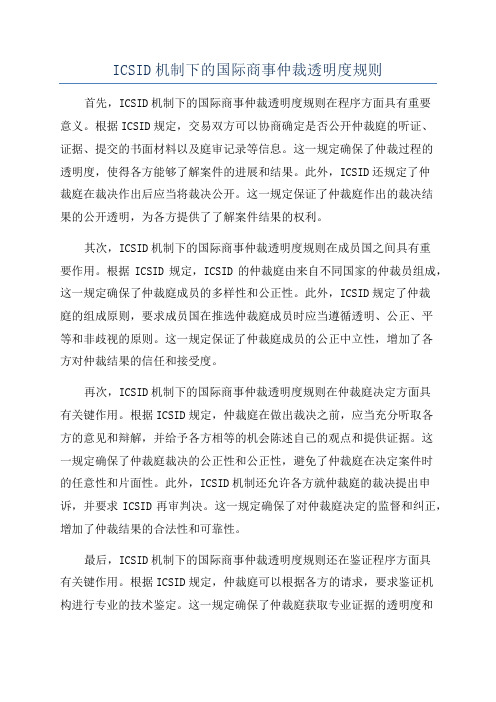
ICSID机制下的国际商事仲裁透明度规则首先,ICSID机制下的国际商事仲裁透明度规则在程序方面具有重要意义。
根据ICSID规定,交易双方可以协商确定是否公开仲裁庭的听证、证据、提交的书面材料以及庭审记录等信息。
这一规定确保了仲裁过程的透明度,使得各方能够了解案件的进展和结果。
此外,ICSID还规定了仲裁庭在裁决作出后应当将裁决公开。
这一规定保证了仲裁庭作出的裁决结果的公开透明,为各方提供了了解案件结果的权利。
其次,ICSID机制下的国际商事仲裁透明度规则在成员国之间具有重要作用。
根据ICSID规定,ICSID的仲裁庭由来自不同国家的仲裁员组成,这一规定确保了仲裁庭成员的多样性和公正性。
此外,ICSID规定了仲裁庭的组成原则,要求成员国在推选仲裁庭成员时应当遵循透明、公正、平等和非歧视的原则。
这一规定保证了仲裁庭成员的公正中立性,增加了各方对仲裁结果的信任和接受度。
再次,ICSID机制下的国际商事仲裁透明度规则在仲裁庭决定方面具有关键作用。
根据ICSID规定,仲裁庭在做出裁决之前,应当充分听取各方的意见和辩解,并给予各方相等的机会陈述自己的观点和提供证据。
这一规定确保了仲裁庭裁决的公正性和公正性,避免了仲裁庭在决定案件时的任意性和片面性。
此外,ICSID机制还允许各方就仲裁庭的裁决提出申诉,并要求ICSID再审判决。
这一规定确保了对仲裁庭决定的监督和纠正,增加了仲裁结果的合法性和可靠性。
最后,ICSID机制下的国际商事仲裁透明度规则还在鉴证程序方面具有关键作用。
根据ICSID规定,仲裁庭可以根据各方的请求,要求鉴证机构进行专业的技术鉴定。
这一规定确保了仲裁庭获取专业证据的透明度和可行性,增加了仲裁结果的科学性和可信度。
此外,ICSID还要求鉴证机构在鉴证过程中公正中立,从而避免了鉴证结果的偏袒和不公正。
综上所述,ICSID机制下的国际商事仲裁透明度规则在维护国际仲裁的公正性和公平性方面发挥着重要作用。
仲裁费标准
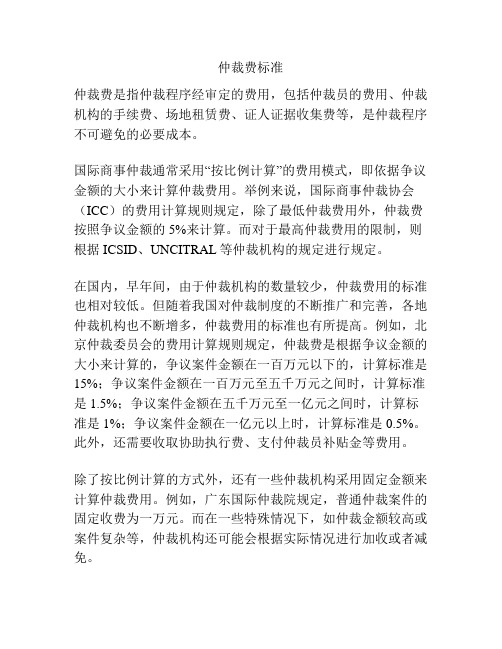
仲裁费标准仲裁费是指仲裁程序经审定的费用,包括仲裁员的费用、仲裁机构的手续费、场地租赁费、证人证据收集费等,是仲裁程序不可避免的必要成本。
国际商事仲裁通常采用“按比例计算”的费用模式,即依据争议金额的大小来计算仲裁费用。
举例来说,国际商事仲裁协会(ICC)的费用计算规则规定,除了最低仲裁费用外,仲裁费按照争议金额的5%来计算。
而对于最高仲裁费用的限制,则根据ICSID、UNCITRAL等仲裁机构的规定进行规定。
在国内,早年间,由于仲裁机构的数量较少,仲裁费用的标准也相对较低。
但随着我国对仲裁制度的不断推广和完善,各地仲裁机构也不断增多,仲裁费用的标准也有所提高。
例如,北京仲裁委员会的费用计算规则规定,仲裁费是根据争议金额的大小来计算的,争议案件金额在一百万元以下的,计算标准是15%;争议案件金额在一百万元至五千万元之间时,计算标准是1.5%;争议案件金额在五千万元至一亿元之间时,计算标准是1%;争议案件金额在一亿元以上时,计算标准是0.5%。
此外,还需要收取协助执行费、支付仲裁员补贴金等费用。
除了按比例计算的方式外,还有一些仲裁机构采用固定金额来计算仲裁费用。
例如,广东国际仲裁院规定,普通仲裁案件的固定收费为一万元。
而在一些特殊情况下,如仲裁金额较高或案件复杂等,仲裁机构还可能会根据实际情况进行加收或者减免。
需要特别注意的是,在进行仲裁时,当事方也需要承担自身的律师费、交通费、住宿费等其他费用,因此在选择仲裁机构时,也需要仔细了解该机构的费用标准及相关规定,以免在仲裁过程中产生不必要的经济负担。
总之,仲裁费标准是国际商事仲裁、国内商事仲裁的核心内容之一,其标准制定需要遵循公正、公平、合理等原则,以保障当事方的权益。
作为仲裁程序必备的组成部分,仲裁费用应当得到当事人的共同理解与尊重,也应当在实践中不断完善和优化,以更好促进仲裁制度的健康发展。
中国国际经济贸易仲裁委员会仲裁规则(2015 版)

中国国际经济贸易仲裁委员会仲裁规则(2015版)(2014年11月4日中国国际贸易促进委员会/中国国际商会修订并通过,自2015年1月1日起施行)第一章总则第一条仲裁委员会(一)中国国际经济贸易仲裁委员会(以下简称“仲裁委员会”),原名中国国际贸易促进委员会对外贸易仲裁委员会、中国国际贸易促进委员会对外经济贸易仲裁委员会,同时使用“中国国际商会仲裁院”名称。
(二)当事人在仲裁协议中订明由中国国际贸易促进委员会/中国国际商会仲裁,或由中国国际贸易促进委员会/中国国际商会的仲裁委员会或仲裁院仲裁的,或使用仲裁委员会原名称为仲裁机构的,均视为同意由中国国际经济贸易仲裁委员会仲裁。
第二条机构及职责(一)仲裁委员会主任履行本规则赋予的职责。
副主任根据主任的授权可以履行主任的职责。
(二)仲裁委员会设有仲裁院,在授权的副主任和仲裁院院长的领导下履行本规则规定的职责。
(三)仲裁委员会设在北京。
仲裁委员会设有分会或仲裁中心(本规则附件一)。
仲裁委员会的分会/仲裁中心是仲裁委员会的派出机构,根据仲裁委员会的授权,接受仲裁申请,管理仲裁案件。
(四)分会/仲裁中心设仲裁院,在分会/仲裁中心仲裁院院长的领导下履行本规则规定由仲裁委员会仲裁院履行的职责。
(五)案件由分会/仲裁中心管理的,本规则规定由仲裁委员会仲裁院院长履行的职责,由仲裁委员会仲裁院院长授权的分会/仲裁中心仲裁院院长履行。
(六)当事人可以约定将争议提交仲裁委员会或仲裁委员会分会/仲裁中心进行仲裁;约定由仲裁委员会进行仲裁的,由仲裁委员会仲裁院接受仲裁申请并管理案件;约定由分会/仲裁中心仲裁的,由所约定的分会/仲裁中心仲裁院接受仲裁申请并管理案件。
约定的分会/仲裁中心不存在、被终止授权或约定不明的,由仲裁委员会仲裁院接受仲裁申请并管理案件。
如有争议,由仲裁委员会作出决定。
第三条受案范围(一)仲裁委员会根据当事人的约定受理契约性或非契约性的经济贸易等争议案件。
(二)前款所述案件包括:1、国际或涉外争议案件;2、涉及香港特别行政区、澳门特别行政区及台湾地区的争议案件;3、国内争议案件。
2024版上海国际仲裁中心仲裁规则
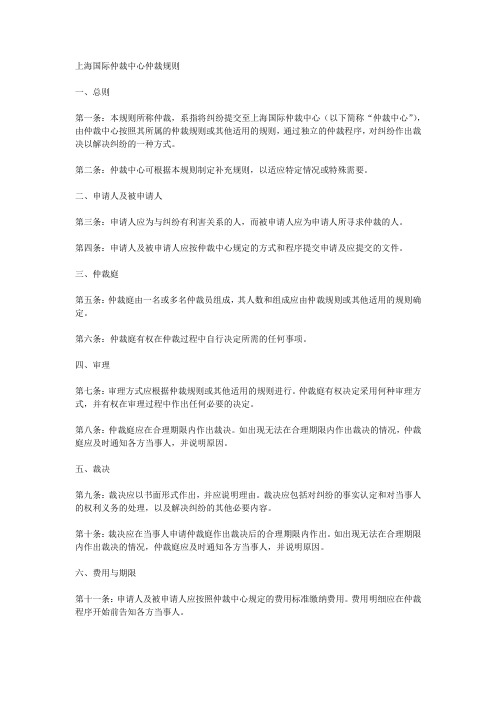
上海国际仲裁中心仲裁规则一、总则第一条:本规则所称仲裁,系指将纠纷提交至上海国际仲裁中心(以下简称“仲裁中心”),由仲裁中心按照其所属的仲裁规则或其他适用的规则,通过独立的仲裁程序,对纠纷作出裁决以解决纠纷的一种方式。
第二条:仲裁中心可根据本规则制定补充规则,以适应特定情况或特殊需要。
二、申请人及被申请人第三条:申请人应为与纠纷有利害关系的人,而被申请人应为申请人所寻求仲裁的人。
第四条:申请人及被申请人应按仲裁中心规定的方式和程序提交申请及应提交的文件。
三、仲裁庭第五条:仲裁庭由一名或多名仲裁员组成,其人数和组成应由仲裁规则或其他适用的规则确定。
第六条:仲裁庭有权在仲裁过程中自行决定所需的任何事项。
四、审理第七条:审理方式应根据仲裁规则或其他适用的规则进行。
仲裁庭有权决定采用何种审理方式,并有权在审理过程中作出任何必要的决定。
第八条:仲裁庭应在合理期限内作出裁决。
如出现无法在合理期限内作出裁决的情况,仲裁庭应及时通知各方当事人,并说明原因。
五、裁决第九条:裁决应以书面形式作出,并应说明理由。
裁决应包括对纠纷的事实认定和对当事人的权利义务的处理,以及解决纠纷的其他必要内容。
第十条:裁决应在当事人申请仲裁庭作出裁决后的合理期限内作出。
如出现无法在合理期限内作出裁决的情况,仲裁庭应及时通知各方当事人,并说明原因。
六、费用与期限第十一条:申请人及被申请人应按照仲裁中心规定的费用标准缴纳费用。
费用明细应在仲裁程序开始前告知各方当事人。
第十二条:仲裁程序应在合理期限内完成。
如无法在合理期限内完成仲裁程序,各方当事人应及时向仲裁庭提出延期申请,并说明原因。
七、其他事项第十三条:任何一方当事人如违反仲裁规则或其他适用的规则,仲裁庭有权决定是否给予警告或给予其他适当的制裁。
第十四条:本规则未规定的事项,应适用相关法律和规定。
八、附则第十五条:本规则自发布之日起生效,并适用于所有通过仲裁中心进行的仲裁活动。
如有其他适用规则,应以相关规定为准。
- 1、下载文档前请自行甄别文档内容的完整性,平台不提供额外的编辑、内容补充、找答案等附加服务。
- 2、"仅部分预览"的文档,不可在线预览部分如存在完整性等问题,可反馈申请退款(可完整预览的文档不适用该条件!)。
- 3、如文档侵犯您的权益,请联系客服反馈,我们会尽快为您处理(人工客服工作时间:9:00-18:30)。
ICSID仲裁规则ICSID Rules of Procedure for Arbitration Proceedings, Arbitration RulesChapter IEstablishment of the TribunalRule 1General Obligations(1)Upon notification of the registration of the request for arbitration, the parties shall, with all possible dispatch, proceed to constitute a Tribunal, with due regard to Section 2 of Chapter IV of the Convention.(2)Unless such information is provided in the request, the parties shall communicate to the Secretary-General as soon as possible any provisions agreed by them regarding the number of arbitrators and the method of their appointment.(3)Except if each member of the Tribunal is appointed by agreement of the parties, nationals of the State party to the dispute or of the State whose national is a party to the dispute may be appointed by a party only if appointment by the other party to the dispute of the same number of arbitrators of either of these nationalities would not result in a majority of arbitrators of these nationalities.(4)No person who had previously acted as a conciliator or arbitrator in any proceeding for the settlement of the dispute may be appointed as a member of the Tribunal.Rule 2Method of Constituting the Tribunal in the Absence of Previous Agreement(1)If the parties, at the time of the registration of the request for arbitration, have not agreed upon the number of arbitrators and the method of their appointment, they shall, unless they agree otherwise, follow the following procedure:(a)the requesting party shall, within 10 days after the registration of the request, propose to the other party the appointment of a sole arbitrator or of a specified uneven number of arbitrators and specify the method proposed for their appointment;(b)within 20 days after receipt of the proposals made by the requesting party, the other party shall:(i)accept such proposals;or(ii)make other proposals regarding the number of arbitrators and the method of their appointment;(c)within 20 days after receipt of the reply containing any such other proposals, the requesting party shall notify the other party whether it accepts or rejects such proposals.(2)The communications provided for in paragraph (1)shall be made or promptly confirmed in writing and shall either be transmitted through the Secretary-General or directly between the parties with a copy to the Secretary-General. The parties shall promptly notify the Secretary-General of the contents of any agreement reached.(3)At any time 60 days after the registration of the request,if no agreement on another procedure is reached, either party may inform the Secretary-General that it chooses the formula provided for in Article 37(2)(b)of the Convention. The Secretary-General shall thereupon promptly inform the other party that the Tribunal is to be constituted in accordance with that Article.Rule 3Appointment of Arbitrators to a Tribunal Constituted in Accordance with Convention Article 37(2)(b)(1)If the Tribunal is to be constituted in accordance with Article 37(2)(b)of the Convention:(a)either party shall in a communication to the other party:(i)name two persons, identifying one of them, who shall not have the same nationality as nor be a national of either party, as the arbitrator appointed by it, and the other as the arbitrator proposed to be the President of the Tribunal;and(ii)invite the other party to concur in the appointment of the arbitrator proposed to be the President of the Tribunal and to appoint another arbitrator;(b)promptly upon receipt of this communication the other party shall, in its reply:(i)name a person as the arbitrator appointed by it, who shall not have the same nationality as nor be a national of either party;and(ii)concur in the appointment of the arbitrator proposed to be the President of the Tribunal or name another person as the arbitrator proposed to be President;(c)promptly upon receipt of the reply containing such a proposal, the initiating party shall notify the other party whether it concurs in the appointment of the arbitrator proposed by that party to be the President of the Tribunal.(2)The communications provided for in this Rule shall be made or promptly confirmed in writing and shall either be transmitted through the Secretary-General or directly between the parties with a copy to the Secretary-General.Rule 4Appointment of Arbitrators by the Chairman of the Administrative Council(1)If the Tribunal is not constituted within 90 days after the dispatch by the Secretary-General of the notice of registration, or such other period as the parties may agree, either party may, through the Secretary-General, address to the Chairman of the Administrative Council a request in writing to appoint the arbitrator or arbitrators not yet appointed and to designate an arbitrator to be the President of the Tribunal.(2)The provision of paragraph (1)shall apply mutatis mutandis in the event that the parties have agreed that the arbitrators shall elect the President of the Tribunal and they fail to do so.(3)The Secretary-General shall forthwith send a copy of the request to the other party.(4)The Chairman shall, with due regard to Articles 38 and 40 (1)of the Convention, and after consulting both parties as far as possible, comply with that request within 30 days after its receipt.(5)The Secretary-General shall promptly notify the parties of any appointment or designation made by the Chairman.Rule 5Acceptance of Appointments(1)The party or parties concerned shall notify the Secretary-General of the appointment of each arbitrator and indicate the method of his appointment.(2)As soon as the Secretary-General has been informed by a party or the Chairman of the Administrative Council of the appointment of an arbitrator, he shall seek an acceptance from the appointee.(3)If an arbitrator fails to accept his appointment within 15 days, the Secretary-General shall promptly notify the parties, and if appropriate the Chairman, and invite them to proceed to the appointment of another arbitrator in accordance with the method followed for the previous appointment.Rule 6Constitution of the Tribunal(1)The Tribunal shall be deemed to be constituted and the proceeding to have begun on the date the Secretary-General notifies the parties that all the arbitrators have accepted their appointment.(2)Before or at the first session of the Tribunal, each arbitrator shall sign a declaration in the following form:To the best of my knowledge there is no reason why I should not serve on the Arbitral Tribunal constituted by the International Centre for Settlement of Investment Disputes with respect to adispute between. andI shall keep confidential all information coming to my knowledge as a result of my participation in this proceeding, as well as the contents of any award made by the Tribunal.I shall judge fairly as between the parties, according to the applicable law, and shall not accept any instruction or compensation with regard to the proceeding from any source except as provided in the Convention on the Settlement of Investment Disputes and in the Regulations and Rules made pursuant thereto.A statement of my past and present professional, business and other relationships (if any)with the parties is attached hereto.Any arbitrator failing to sign a declaration by the end of the first session of the Tribunal shall be deemed to have resigned.Rule 7Replacement of ArbitratorsAt any time before the Tribunal is constituted, each party may replace any arbitrator appointed by it and the parties may by common consent agree to replace any arbitrator. The procedure of such replacement shall be in accordance with Rules l, 5 and 6.Rule 8Incapacity or Resignation of Arbitrators(1)If an arbitrator becomes incapacitated or unable to perform the duties of his office, the procedure in respect of the disqualification of arbitrators set forth in Rule 9 shall apply.(2)An arbitrator may resign by submitting his resignation to the other members of the Tribunal and the Secretary-General. Ifthe arbitrator was appointed by one of the parties, the Tribunal shall promptly consider the reasons for his resignation and decide whether it consents thereto. The Tribunal shall promptly notify the Secretary-General of its decision.Rule 9Disqualification of Arbitrators(1)A party proposing the disqualification of an arbitrator pursuant to Article 57 of the Convention shall promptly, and in any event before the proceeding is declared closed, file its proposal with the Secretary-General, stating its reasons therefor.(2)The Secretary-General shall forthwith:(a)transmit the proposal to the members of the Tribunal and, if it relates to a sole arbitrator or to a majority of the members of the Tribunal, to the Chairman of the Administrative Council;and (b)notify the other party of the proposal.(3)The arbitrator to whom the proposal relates may, without delay, furnish explanations to the Tribunal or the Chairman, as the case may be.(4)Unless the proposal relates to a majority of the members of the Tribunal, the other members shall promptly consider and vote on the proposal in the absence of the arbitrator concerned. If those members are equally divided, they shall, through the Secretary-General, promptly notify the Chairman of the proposal, of any explanation furnished by the arbitrator concerned and of their failure to reach a decision.(5)Whenever the Chairman has to decide on a proposal todisqualify an arbitrator, he shall take that decision within 30 days after he has received the proposal.(6)The proceeding shall be suspended until a decision has been taken on the proposal.Rule 10Procedure during a Vacancy on the Tribunal(1)The Secretary-General shall forthwith notify the parties and, if necessary, the Chairman of the Administrative Council of the disqualification, death, incapacity or resignation of an arbitrator and of the consent, if any, of the Tribunal to a resignation.(2)Upon the notification by the Secretary-General of a vacancy on the Tribunal, the proceeding shall be or remain suspended until the vacancy has been filled.Rule 11Filling Vacancies on the Tribunal(1)Except as provided in paragraph (2), a vacancy resulting from the disqualification, death, incapacity or resignation of an arbitrator shall be promptly filled by the same method by which his appointment had been made.(2)In addition to filling vacancies relating to arbitrators appointed by him, the Chairman of the Administrative Council shall appoint a person from the Panel of Arbitrators:(a)to fill a vacancy caused by the resignation, without the consent of the Tribunal, of an arbitrator appointed by a party;or (b)at the request of either party, to fill any other vacancy, if no new appointment is made and accepted within 30 days of thenotification of the vacancy by the Secretary-General.(3)The procedure for filling a vacancy shall be in accordance with Rules 1, 4(4), 4(5), 5 and, mutatis mutandis, 6(2)。
